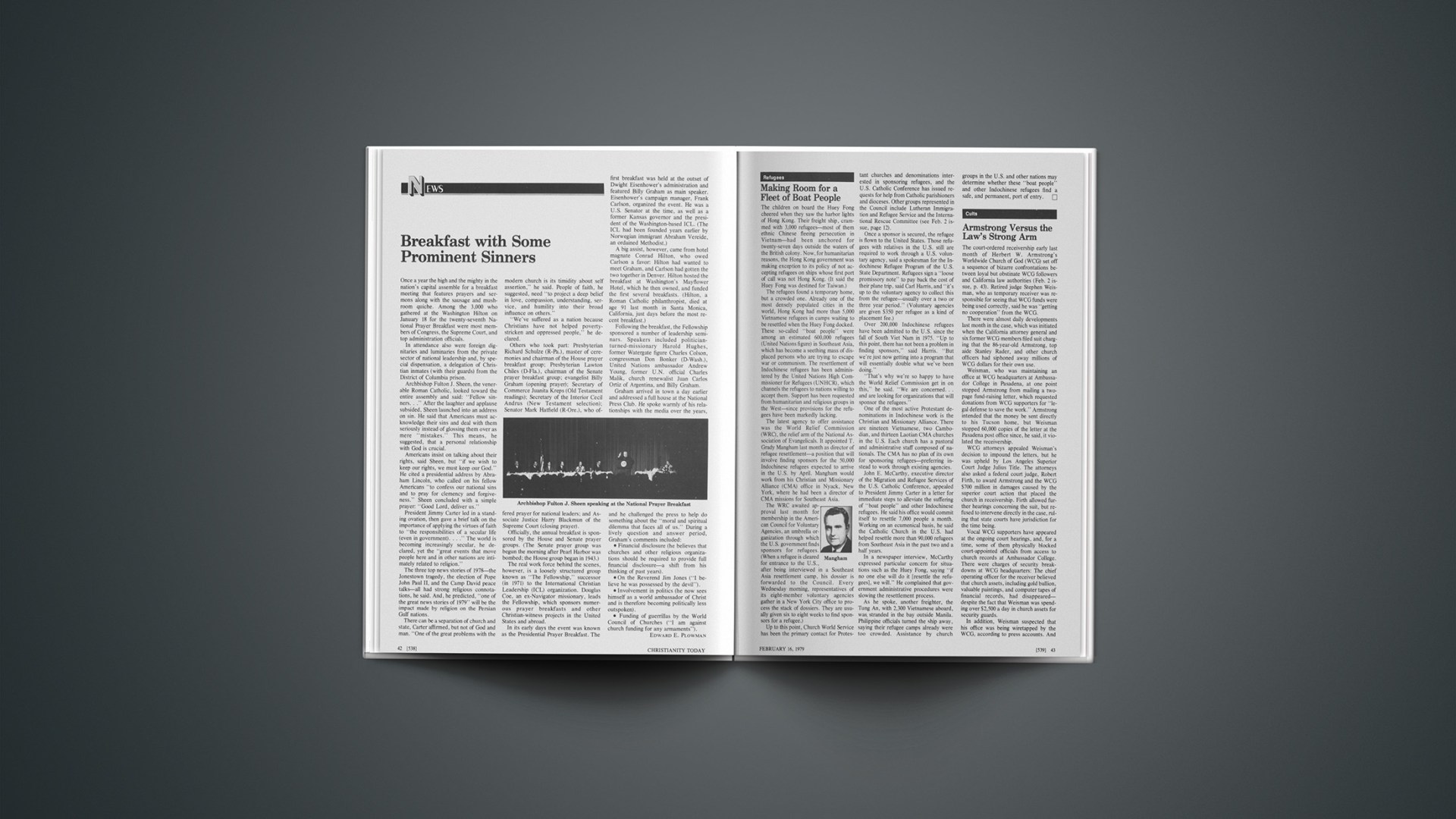The children on board the Huey Fong cheered when they saw the harbor lights of Hong Kong. Their freight ship, crammed with 3,000 refugees—most of them ethnic Chinese fleeing persecution in Vietnam—had been anchored for twenty-seven days outside the waters of the British colony. Now, for humanitarian reasons, the Hong Kong government was making exception to its policy of not accepting refugees on ships whose first port of call was not Hong Kong. (It said the Huey Fong was destined for Taiwan.)
The refugees found a temporary home, but a crowded one. Already one of the most densely populated cities in the world, Hong Kong had more than 5,000 Vietnamese refugees in camps waiting to be resettled when the Huey Fong docked. These so-called “boat people” were among an estimated 600,000 refugees (United Nations figure) in Southeast Asia, which has become a seething mass of displaced persons who are trying to escape war or communism. The resettlement of Indochinese refugees has been administered by the United Nations High Commissioner for Refugees (UNHCR), which channels the refugees to nations willing to accept them. Support has been requested from humanitarian and religious groups in the West—since provisions for the refugees have been markedly lacking.
The latest agency to offer assistance was the World Relief Commission (WRC), the relief arm of the National Association of Evangelicals. It appointed T. Grady Mangham last month as director of refugee resettlement—a position that will involve finding sponsors for the 50,000 Indochinese refugees expected to arrive in the U.S. by April. Mangham would work from his Christian and Missionary Alliance (CMA) office in Nyack, New York, where he had been a director of CMA missions for Southeast Asia.
The WRC awaited approval last month for membership in the American Council for Voluntary Agencies, an umbrella organization through which the U.S. government finds sponsors for refugees. (When a refugee is cleared Mangham for entrance to the U.S., after being interviewed in a Southeast Asia resettlement camp, his dossier is forwarded to the Council. Every Wednesday morning, representatives of its eight-member voluntary agencies gather in a New York City office to process the stack of dossiers. They are usually given six to eight weeks to find sponsors for a refugee.)
Up to this point, Church World Service has been the primary contact for Protestant churches and denominations interested in sponsoring refugees, and the U.S. Catholic Conference has issued requests for help from Catholic parishioners and dioceses. Other groups represented in the Council include Lutheran Immigration and Refugee Service and the International Rescue Committee (see Feb. 2 issue, page 12).
Once a sponsor is secured, the refugee is flown to the United States. Those refugees with relatives in the U.S. still are required to work through a U.S. voluntary agency, said a spokesman for the Indochinese Refugee Program of the U.S. State Department. Refugees sign a “loose promissory note” to pay back the cost of their plane trip, said Carl Harris, and “it’s up to the voluntary agency to collect this from the refugee—usually over a two or three year period.” (Voluntary agencies are given $350 per refugee as a kind of placement fee.)
Over 200,000 Indochinese refugees have been admitted to the U.S. since the fall of South Viet Nam in 1975. “Up to this point, there has not been a problem in finding sponsors,” said Harris. “But we’re just now getting into a program that will essentially double what we’ve been doing.”
“That’s why we’re so happy to have the World Relief Commission get in on this,” he said. “We are concerned … and are looking for organizations that will sponsor the refugees.”
One of the most active Protestant denominations in Indochinese work is the Christian and Missionary Alliance. There are nineteen Vietnamese, two Cambodian, and thirteen Laotian CMA churches in the U.S. Each church has a pastoral and administrative staff composed of nationals. The CMA has no plan of its own for sponsoring refugees—preferring instead to work through existing agencies.
John E. McCarthy, executive director of the Migration and Refugee Services of the U.S. Catholic Conference, appealed to President Jimmy Carter in a letter for immediate steps to alleviate the suffering of “boat people” and other Indochinese refugees. He said his office would commit itself to resettle 7,000 people a month. Working on an ecumenical basis, he said the Catholic Church in the U.S. had helped resettle more than 90,000 refugees from Southeast Asia in the past two and a half years.
In a newspaper interview, McCarthy expressed particular concern for situations such as the Huey Fong, saying “if no one else will do it [resettle the refugees], we will.” He complained that government administrative procedures were slowing the resettlement process.
As he spoke, another freighter, the Tung An, with 2,300 Vietnamese aboard, was stranded in the bay outside Manila. Philippine officials turned the ship away, saying their refugee camps already were too crowded. Assistance by church groups in the U.S. and other nations may determine whether these “boat people” and other Indochinese refugees find a safe, and permanent, port of entry.










